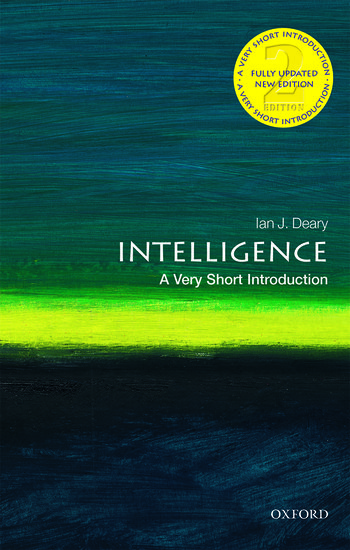Home >
A Very Short Introduction >
Intelligence (2nd edition) | 知能 (Psychology)
A Very Short Introduction | Psychology
Intelligence (2nd edition) | 知能
ISBN: 9780198796206
Series: A Very Short Introduction
Intelligence (2nd edition) | 知能 (Psychology)
A Very Short Introduction Intelligence (2nd edition) | 知能 (Psychology) メディア > 書籍 > ノンフィクション > 言語学習書 Expect Delays of Up to 4 Weeks| ご注文はこちら |
ISBN
9780198796206 (旧規格ISBN: 019879620X)
- 説明
- 特徴
- シリーズの説明
- 目次
- Describes what psychologists have discovered about how and why people differ in their thinking powers
- Includes a new chapter on sex differences in intelligence
- Considers the new field of cognitive epidemiology, which draws links between intelligence and better health, less illness, and longer life
- Includes new work on DNA testing and intelligence genetics
思考力に個人差があるのはなぜなのでしょうか。改訂第2版は膨大なデータから知能にはどのような種類があり、それが年齢とともにどう変化するのかを読み解き心理学者たちが辿りついた答えをまとめていきます。そのなかで大きな脳の持ち主ほど知能が高いのか、遺伝子と環境が人の知能の違いにどのような影響を与えるのか、といった火急の問題に取り組みます。また、知能と健康、長寿との関係性を研究する新しい研究領域の認知疫学や、知能の性差のような物議を醸すトピックも取り上げて考察します。
難解なテーマを分かりやすく解説する入門書シリーズ
Very Short Introductions (VSI) シリーズは、1995年に Mary Beard 著『Classics』の刊行をもって創刊し、以来、歴史や政治、宗教、哲学、科学、時事問題、ビジネス、経済、芸術、文化など、様々な分野のテーマを取り上げてきました。発行点数も数多く、現在までに680タイトル以上を刊行しています。
本シリーズは、世界各国の評論家からの評価も高く、知識欲の強い読者の間では定番の入門書として定着しつつあります。販売部数は全世界で1,000万部を超え、53ヶ国語の言語に翻訳されています。
専門家による分析や新しい見解を盛り込みながら、イスラム教からポスト構造主義、宇宙論まで、難解なテーマを平易に説く、刺激に満ちた Very Short Introductions は、初学者にとって最適の入門書であり、予備知識のある読者には新たな視点を提供します。一般の方や大学生、大学院生に愛読されているほか、大学の授業にも採用されるなど、幅広くご活用いただいています。
注意:このシリーズはELT教材に該当しないため割引対象外です。
1: Preface and acknowledgements
2: What happens to intelligence as we grow older?
3: Are there sex differences in intelligence?
4: What are the contributions of environments and genes to intelligence differences?
5: Are smarter people faster?
6: What do more intelligent brains look like?
7: Does intelligence matter in the school and the workplace?
8: Does intelligence matter for good health and long life?
9: Is intelligence increasing generation after generation?
10: Do psychologists agree about intelligence differences?
Further reading
Appendix: An explanation of Correlation and Meta-analysis
Index
思考力に個人差があるのはなぜなのでしょうか。改訂第2版は膨大なデータから知能にはどのような種類があり、それが年齢とともにどう変化するのかを読み解き心理学者たちが辿りついた答えをまとめていきます。そのなかで大きな脳の持ち主ほど知能が高いのか、遺伝子と環境が人の知能の違いにどのような影響を与えるのか、といった火急の問題に取り組みます。また、知能と健康、長寿との関係性を研究する新しい研究領域の認知疫学や、知能の性差のような物議を醸すトピックも取り上げて考察します。
特徴
- Describes what psychologists have discovered about how and why people differ in their thinking powers
- Includes a new chapter on sex differences in intelligence
- Considers the new field of cognitive epidemiology, which draws links between intelligence and better health, less illness, and longer life
- Includes new work on DNA testing and intelligence genetics
シリーズの説明
難解なテーマを分かりやすく解説する入門書シリーズ
Very Short Introductions (VSI) シリーズは、1995年に Mary Beard 著『Classics』の刊行をもって創刊し、以来、歴史や政治、宗教、哲学、科学、時事問題、ビジネス、経済、芸術、文化など、様々な分野のテーマを取り上げてきました。発行点数も数多く、現在までに680タイトル以上を刊行しています。
本シリーズは、世界各国の評論家からの評価も高く、知識欲の強い読者の間では定番の入門書として定着しつつあります。販売部数は全世界で1,000万部を超え、53ヶ国語の言語に翻訳されています。
専門家による分析や新しい見解を盛り込みながら、イスラム教からポスト構造主義、宇宙論まで、難解なテーマを平易に説く、刺激に満ちた Very Short Introductions は、初学者にとって最適の入門書であり、予備知識のある読者には新たな視点を提供します。一般の方や大学生、大学院生に愛読されているほか、大学の授業にも採用されるなど、幅広くご活用いただいています。
注意:このシリーズはELT教材に該当しないため割引対象外です。
EASY ORDER FORM
表示価格が税込価格
価格(税抜):
1,790 円


